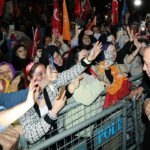The narrative emerging among the more nationalistic elements of Erdoğan’s cadre is that the West is interfering in elections. This rhetoric is designed to tie democracies’ hands if they attempt to support a free and fair election. They shouldn’t let it.
On Sunday, the people of Turkey will vote in this year’s most important election. The close race between incumbent President Recep Tayyip Erdoğan and opposition leader Kemal Kılıçdaroğlu will determine the course of Turkey’s future: whether it will continue to slide into authoritarianism or begin the hard task of restoring its democratic institutions. But as the race remains close and tensions rise, Erdoğan may resort to blaming foreign interference for a loss and refuse to leave office.
Though not entirely reliable, polls show a very tight race with a slight lead for Kılıçdaroğlu. If genuine, this lead could be upset any number of ways—particularly in an election that is neither free nor fair. Erdoğan’s party controls the media as well as the judiciary, has interfered in elections before, and has been known to employ intimidation at the ballots, especially in majority-Kurdish regions.
However: if Erdoğan loses badly enough that he cannot deploy his usual arsenal of malicious electioneering tactics, the West should be ready for a more theatrical kind of power grab—one in which it plays a starring role. Western powers will need to repudiate the narrative emerging among the more nationalistic elements of Erdoğan’s cadre, namely, that the West is interfering in elections in order to back the opposition candidate. In addition to playing well with his nationalistic base, this rhetoric is designed to tie democracies’ hands if they attempt to support a free and fair election. They shouldn’t let it.
The AKP is already paving the way for this approach. Presidential adviser Mehmet Uçum said on Habertürk TV that a change in government would be a threat to territorial unity from the West. Erdogan has said he will not “hand over this country to someone who becomes president with the support of Kandil [the outlawed Kurdistan Worker’s Party, or PKK].” He has even shown a deepfake video of PKK members expressing support for Kılıçdaroğlu. Binali Yıldırım, Turkey’s last Prime Minister and current AKP Deputy Chair, has accused a host of foreign actors of interference, including the United States, Europe, the PKK, and “FETO,” an organization that Turkey blames (along with the United States) for the 2016 coup attempt.
It is becoming increasingly clear that Erdoğan and his party plan to revive and recycle the demagoguery it employed in 2016 about the West in the coming weeks. These accusations are easy to dismiss, or even laugh at, for those of us who write safely from New York or D.C. But in a country where 90% of the media is controlled by the state, and where that state is becoming increasingly skilled at online manipulation, they need to be taken seriously.
The Turkish state responded to the 2016 coup attempt—which it blames on the exiled cleric Fetullah Gulen and his supporters—with hundreds of thousands of arrests and dismissals. A threat to national security became an opportunity for Erdoğan to cement his control of the state, purging it of journalists, lawmakers, judges, military personnel, and police who were not loyal. The worst-case scenario for this election is one in which Erdoğan uses the lessons he learned in 2016 to declare a state of emergency, increase security measures, and silence any dissent or protests.
Turkey will be especially vulnerable to this kind of crackdown if elections go to a second round on May 28. The interim period is likely to be volatile, and AKP rhetoric about the PKK and/or Western interference could make it more so. Many fear that Erdoğan will attempt to incite violence in the street—in fact he has already called for his supporters to “claim independence at the expense of our lives.” He may declare a state of emergency, suspend Twitter as he did after the earthquake, make sweeping arrests as he did in 2016, and/or silence anyone who supports his democratic ouster.
The West must be ready to oppose this kind of behavior during the interim period while refuting demonizing rhetoric from the AKP, which is trying to de-legitimize an opposition victory before it happens. Interior Minister Süleyman Soylu has already compared the elections to 2016, calling them the “May 14 political coup attempt” and claiming that the West is involved.
There is always the fervent hope that none of these tactics work—that Turkey’s civic institutions hold up and resist inevitable pressure from the state. Indeed, many prominent analysts have pointed out that there is precedent for this. But in the darkest timeline, this election may come to be known in an authoritarian Turkey as the “May 14 coup.” To the rest of the world, it would be known as Turkey’s last competitive election.
The views and opinions expressed above are the author’s and do not reflect those of the Free Turkish Press.


